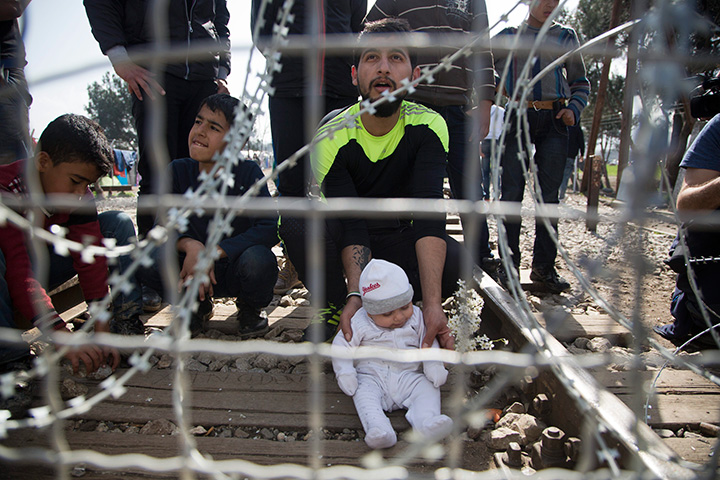IDOMENI, Greece – On foot or by taxi, hundreds of exhausted refugee families trying to reach Western Europe flocked Tuesday to a burgeoning tent city on Greece’s border with Macedonia, which has not allowed anybody in for 24 hours, citing a similar policy by Serbia further north.

The impasse drew strongly worded criticism from the United Nations refugee agency, which warned that Europe “is on the cusp of a largely self-induced humanitarian crisis.”
A UNHCR statement said inconsistent policies in the continent, which faces its worst immigration crisis since the end of World War II, “are causing unnecessary suffering and risk being at variance with EU and international law standards.”
READ MORE: Fiery backlash as Calais migrant camp dismantled in France
Greek police say there could be up to 10,000 people – mostly Syrian and Iraqi refugees – stuck at the country’s Idomeni border crossing now in deteriorating conditions. Hundreds of tents fill the fields stretching toward the border fence, which is patrolled on the Macedonian side by scores of regular police, Macedonian special police forces and police from other Balkan countries.
During the day on Monday, Macedonia let in only 30 refugees.
The Idomeni crossing has become a key flashpoint in Europe’s migration crisis. Several European nations, led by Austria, have imposed refugee caps and border restrictions over the past 10 days, creating a huge backlog of migrants in Greece. These unilateral actions have infuriated Greece and threaten to damage the unity of the 28-nation European Union.
The New York-based Human Rights Watch rights group directly blamed “discriminatory border closures” and a cap imposed by Austria for the situation at Idomeni.
“Trapping asylum seekers in Greece is an unconscionable and short-sighted non-solution that is causing suffering and violence,” HRW Greece specialist Eva Cosse said. “It demonstrates once again the EU’s utter failure to respond collectively and compassionately to refugee flows.”
READ MORE: Tempers flare as migrants stuck at Greek-Macedonian border
European Union President Donald Tusk was in Austria Tuesday to try to persuade Chancellor Werner Faymann to change his mind about the country’s decision to accept no more than 80 requests for asylum a day at Austria’s southern border with Slovenia, but Faymann said he is holding firm. The cap has caused a ripple effect as other countries southwest of Austria stop people from getting through.
Faymann said Austria is neither a “waiting room for Germany” nor – in an allusion to Greece – prepared to accept the “policy of waving through” migrants to the rest of the EU through Austria.
The Greek government, meanwhile, said it has requested 480 million euros in aid for the refugee crisis from the EU, under an emergency plan that foresees about 100,000 people being stranded in the country.
“That does not mean that this is easy to manage, or that this is what we can take,” government spokeswoman Olga Gerovassili said. “There must be a permanent solution on where the refugees will be relocated and what burden each country will shoulder, not just financial but also regarding how many refugees they will take in.”
Some migrants have been waiting at Idomeni for more than a week. The camp is full and hundreds more people arrive daily. Overnight rain soaked many families, who hung up clothing to dry in the sun Tuesday.
READ MORE: Belgium puts in border controls as court ponders Calais camp
Jasmin Rexhepi, head of the aid group Legis, which has volunteers working in Macedonia on its borders with Greece and Serbia, told The Associated Press that Macedonian authorities were restricting the numbers of migrants they let through because Serbia only allowed 30 people from a train carrying 410 to cross its border Monday. He said Macedonia was waiting for Serbia to open that border.
About 70 adults and children, mostly from Pakistan, have been stuck on the Macedonian side of the border between two razor-wire fences for three days. Rexhepi said Macedonian authorities had been trying to send them back to Greece because they had crossed the border illegally, but Greece was refusing to take them.
“We are providing food, water, sleeping bags and raincoats for this group,” Rexhepi said.
On the Greek side, another group of 150 people who have been told it’s their turn to enter Macedonia have spent days in a large, flimsy tent in front of the crossing.
“I’ve been at Idomeni for 10 days and it’s the fourth day I’ve been waiting to cross over,” said Hassan Rasheed, 27, from Iraq. “Conditions are very bad. There are many ill children who are coughing, and we spent the night in this tent under heavy rain.”
Macedonia closed its border following clashes Monday when hundreds of migrants tried to force their way into the country. Police responded with tear gas and stun grenades, driving the refugees back.
Nevertheless, small groups arrive in a steady flow, mostly on foot after walking up to 30 kilometres (18 miles) along Greece’s northern highways.
One was Ahmed Majid, a 26-year-old Iraqi travelling with his wife and two children.
“We have been walking for 3 kilometres. Police stopped our taxi on the national road, which is why we are going through the fields,” Majid said.
Greece, meanwhile, deported 69 people from North Africa back to Turkey at the Kipi border crossing, saying they were only seeking better jobs and were not refugees in need of protection. A further 230 people are to be sent back by Wednesday, mostly Moroccan, Algerian and Tunisian citizens.
—-
Testorides contributed from Skopje, Macedonia. Nicholas Paphitis and Elena Becatoros in Athens contributed.



Comments